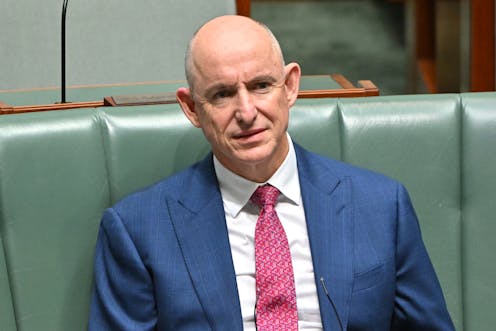Easy Liberal wins likely in byelections in Robert's and Morrison's seats; support for rise in JobSeeker
- Written by Adrian Beaumont, Election Analyst (Psephologist) at The Conversation; and Honorary Associate, School of Mathematics and Statistics, The University of Melbourne

On Saturday former Liberal minister Stuart Robert announced[1] that he would soon retire from politics, setting up a byelection in his Queensland seat of Fadden.
There has been recent speculation[2] that former Liberal PM Scott Morrison will also soon retire, which would mean a byelection in his New South Wales seat of Cook.
At the 2022 federal election, Robert won Fadden[3] by a 60.6-39.4 margin over Labor, while Morrison won Cook[4] by a 62.4-37.6 margin over Labor.
At the April 1 federal Aston byelection[5], Labor had a 6.4% swing in its favour to overturn a 52.8-47.2 Liberal margin at the 2022 election. Even if Labor achieved such a swing in its favour in Fadden and Cook, these seats would still be comfortable holds for the Liberals.
As they are very unlikely to win either Fadden or Cook at byelections, and could be embarrassed if there were a swing to the Liberals in either seat, I do not expect Labor to contest either byelection.
Pre-budget Essential poll: 53-41 to Labor including undecided
In last week’s pre-budget federal Essential poll[6], conducted in the days before May 2 from a sample of 1,130, Labor led by 53-41, an increase from 52-43 four weeks ago. Primary votes were 33% Labor (down one), 32% Coalition (up one), 14% Greens (steady), 5% One Nation (down one), 2% UAP (down one), 8% for all Others (down one) and 5% undecided (up one).
Despite the Coalition’s primary vote gain, Labor increased their two party lead. That suggests respondent preference flows to Labor were stronger than previously.
By 48-29, respondents supported raising the JobSeeker rate without a cost of living component in the question (this applied to half the sample). With the cost of living component, support was 50-29. An additional question from the April Resolve poll[7] had support for increasing JobSeeker at 43-31.
Respondents were asked to rate Anthony Albanese and Peter Dutton[8] from 0 to 10, then ratings of 0-3 were counted as negative, 4-6 as neutral and 7-10 as positive. Albanese improved to a 41-24 positive rating from 40-27 in March, while Dutton dropped to 35-23 negative from 33-26.
Asked to name the treasurer, 33% correctly named Jim Chalmers. By 41-27, voters approved of his job performance. By 45-42, voters thought the budget could make a difference to the cost of living.
For health, education and social security, far more people thought government spending was too low rather than too high. For renewable energy projects and the NDIS, the difference between too low and too high was much reduced. For defence, more people thought spending too high than too low.
On taxes, far more thought personal taxes too high rather than too low, but too low and too high were equal for taxes on oil and gas producers and too low was far ahead for taxes on international corporations.
By 52-22, voters supported allowing New Zealanders who have lived in Australia for at least four years to become Australian citizens.
Morgan poll: 53.5-46.5 to Labor
In last week’s weekly federal Morgan poll[9], conducted April 24-30, Labor led by 53.5-46.5, a three-point gain for the Coalition since the previous week. Primary votes were 36% Labor, 35.5% Coalition, 13% Greens and 15.5% for all Others. I believe this is Labor’s worst result in a Morgan poll since late November 2022[10].
UK local elections were disappointing for Labour
I covered Thursday’s United Kingdom local government elections for The Poll Bludger[11]. The Conservatives lost over 1,000 councillors, but Labour only had a nine-point margin over the Conservatives on the BBC’s Projected National Share.
While that’s Labour’s best performance since they were last in government nationally in 2010, it was much worse than current national polls that give Labour about a 17-point lead.
A United States debt default could occur as early as June 1 if no action is taken by Congress to lift the debt limit. The May 14 Turkish election and May 21 Greek election were also covered.
Incumbents easily re-elected at Tasmanian upper house elections
Every May two or three of Tasmania’s 15 upper house seats are up for election for six-year terms. On Saturday there were elections in Rumney, Murchison and Launceston. Independents in the latter two held with over 70% of the primary vote, while Labor’s Sarah Lovell won 50.5% of the primary in Rumney[12], with 26.5% for the Liberals and 16.6% for a conservative independent.
These results mean the status quo in the upper house is retained. Analyst Kevin Bonham[13] said there are four Labor out of 15, four Liberals, three left-wing independents, one centrist independent and three conservative independents. The Liberals hold a majority in the lower house.
References
- ^ Stuart Robert announced (www.abc.net.au)
- ^ recent speculation (www.skynews.com.au)
- ^ Fadden (results.aec.gov.au)
- ^ Cook (results.aec.gov.au)
- ^ Aston byelection (results.aec.gov.au)
- ^ Essential poll (essentialreport.com.au)
- ^ April Resolve poll (www.smh.com.au)
- ^ Albanese and Peter Dutton (essentialreport.com.au)
- ^ federal Morgan poll (www.roymorgan.com)
- ^ late November 2022 (theconversation.com)
- ^ The Poll Bludger (www.pollbludger.net)
- ^ Rumney (www.tec.tas.gov.au)
- ^ Analyst Kevin Bonham (kevinbonham.blogspot.com)













